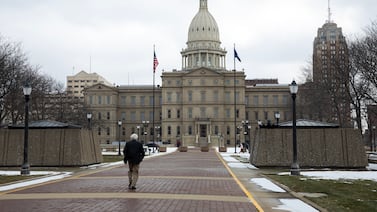LANSING — A Saginaw County attorney is accusing Gov. Gretchen Whitmer of disenfranchising voters in Michigan’s 35th state Senate district, arguing in a lawsuit that her refusal to call a special election for a long-vacant seat “undermines public trust … and erodes the legitimacy of enacted laws.”
“In a democratic republic, the absence of representation is not a mere inconvenience — it is a denial of one of the most fundamental political rights,” attorney Philip Ellison, with Outside Legal Counsel, wrote in a suit filed Monday in the Michigan Court of Claims on behalf of seven local residents.
“Every legislative day that passes without a senator from District 35 silences an entire community in the lawmaking process.”
The complaint asks a judge to order Whitmer to call a special election within seven days. The governor’s office did not respond to a request for comment on the lawsuit.
The seat in the 35th Senate District — which includes parts of Bay, Midland and Saginaw counties — has been vacant for the last seven months after Democrat Kristen McDonald Rivet was elected to the U.S. House and officially left the Michigan Senate on Jan. 3.
More than 200 days later, the seat sits empty, with approximately 270,000 residents lacking state Senate representation. Officials with the governor’s office have offered little clarity on when she might call a special election, other than to say an announcement may be coming “in the near future.”
Critics have accused Whitmer of playing politics: Democrats currently hold a 19-18 edge in the state Senate. Republicans are hoping to flip the seat, which could give them a chance to block bills.
Ellison told Bridge Michigan on Monday he views the lawsuit as a test of the state’s Constitution, which holds that a governor “shall issue writs of election to fill vacancies in the senate or house of representatives.”
There’s no deadline written into the state’s governing document, but that doesn’t mean Whitmer “doesn’t have any obligation” to call the election, Ellison said.
“The Constitution itself provides an affirmative mandate that the governor has a responsibility to do something,” he argued.
Those arguments may not hold up in court though, according to Steve Liedel, an attorney with Lansing’s Dykema law firm who served as chief legal counsel to former Gov. Jennifer Granholm.
He called the lawsuit “frivolous.”
Writs of mandamus — the kind of court order that Ellison’s lawsuit seeks — do not legally apply to governors, Liedel said. He added that Ellison’s presumption that Whitmer won’t call a special election in the district is “premature.”
“The Constitution is pretty clear: the governor decides” when to hold a special election, said Liedel, who also worked as general counsel for Whitmer’s transition team in 2018.
“I can’t think of an instance, under the current Constitution, where a governor has ever been ordered by a court to do something,” he continued. “Certainly, not by writ of mandamus.”
The Michigan Constitution does require a governor to call a special election in the event of a vacancy, but offers no concrete timeline on how soon following a vacancy one must be held.
Lawmakers have tried to impose a deadline in past sessions, but Whitmer vetoed legislation that made it to her desk in 2022, saying she did not want to “tie the hands of future Michigan governors.”
This article first appeared on Bridge Michigan and is republished here under a Creative Commons Attribution-NoDerivatives 4.0 International License.
Jordyn Hermani covers state policy and politics for Bridge Michigan. She can be reached at jhermani@bridgemi.com.






